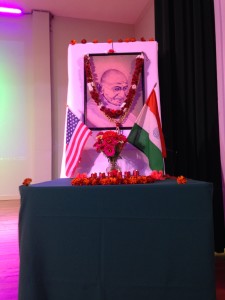 The India Center in Charleston, West Virginia celebrates Gandhi Jayanti, (Spinning Wheel Day, in honor of Gandhi’s birthday, October 2) each year by inviting a guest speaker to talk about a different theme relating to Gandhi and nonviolence. The celebration also includes dinner, interfaith prayers, songs by the children’s choir, and a poster and essay contest for school-aged youth.
The India Center in Charleston, West Virginia celebrates Gandhi Jayanti, (Spinning Wheel Day, in honor of Gandhi’s birthday, October 2) each year by inviting a guest speaker to talk about a different theme relating to Gandhi and nonviolence. The celebration also includes dinner, interfaith prayers, songs by the children’s choir, and a poster and essay contest for school-aged youth.
I was really impressed with the entries and how much the children were taking Gandhi’s message to heart. To paraphrase Gandhi paraphrasing Maria Montessori, if we are to have peace, we must begin with the children, and these children give much hope in their early studies and appreciation of Gandhi’s life and legacy of nonviolence. (more…)
 The Values of Peace & Freedom
The Values of Peace & Freedom








 The
The  Gatto calls this
Gatto calls this  Nonviolence as Artful Work
Nonviolence as Artful Work